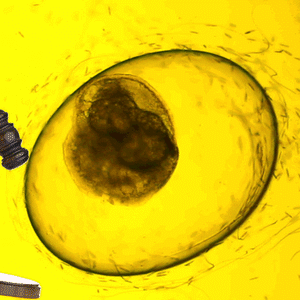Fifteen years ago, Marisa Cloutier-Bristol went through in vitro fertilization (IVF) at Rhode Island fertility clinic in hopes of having a second child. Sadly, she says, her doctor told her none of the embryos were viable.
So imagine her shock when, in 2017, she got a letter from the clinic informing her that one of the embryos had been frozen all this time—even while she was undergoing more failed treatments with her second husband—and that she had to start paying for it.
Now, Cloutier-Bristol is suing the Providence’s Women & Infants’ Fertility Center and its associated hospital for negligence, breach of contract, and emotional distress.
ADVERTISEMENT
According to the court papers, she is “tortured” by the idea that she missed the chance to have another child with her first husband, who died two years after they stopped getting treated at the clinic.
“This whole episode has reopened the grief of losing him,” Jeffrey Catalano, Cloutier-Bristol’s lawyer, told The Daily Beast on Monday, saying his client has fallen into a “severe depression.”
Cloutier-Bristol, 45, did not respond to a request for comment, but she told the Providence Journal that the discovery of the embryo—which she is now forced to keep “cryopreserved for eternity”—has caused her nothing but anguish.
“It’s like grieving a child that I could’ve had that I don’t have,” she told the newspaper in an interview at her North Attleboro, Massachusetts, home. “I feel completely and totally robbed.”
The lawsuit says that in 2003, Cloutier-Bristol and her first husband, John, signed up for IVF at Women and Infants’ and underwent three cycles that yielded four embryos.
Cloutier-Bristol claims that the doctor told her that all four were non-viable, and that the couple stopped trying to conceive.
“At that point she, we thought, was just going to discard them because I was not having an input back,” Cloutier-Bristol told the Journal. “She never told me that she was going to freeze anything.”
But that’s exactly what happened, according to the suit, which claims that Women and Infants’ froze one of the embryos in 2004 without informing the couple or asking them to sign the necessary consent forms.
Two years later, John suffered a heart attack and died. Cloutier-Bristol returned in 2008 with her second husband, Michael, to try again. At no time, the lawsuit claims, did anyone at the facility inform her that she had a frozen embryo—despite the fact that company documents allegedly show that Women and Infants’ was aware of its existence. After Cloutier-Bristol’s ovaries didn’t produce enough follicles, the new couple decided to stop the treatment.
Cloutier-Bristol didn’t hear from Women and Infants’ for eight years, according to the lawsuit—until the fateful August 2017 day when she received a letter at her North Attleboro home informing her that she had to begin paying $500 a year for embryo storage. She assumed the message was sent in error—but after weeks of back-and-forth, she was told of the embryo’s existence.
“I was just in shock,” Cloutier-Bristol told the Journal. “I was furious. I don’t know how that could’ve happened.”
Now, the suit claims, there’s nothing she can do.
Because the clinic never asked her and John to sign a consent form detailing what should be done in the event of a death or divorce, there’s no way to legally ascertain her late husband’s wishes—an error that the suit describes as a “deviation from the existing standards of care and a serious breach of medical ethics.”
“Unfortunately, Mrs. Cloutier-Bristol cannot now have it transferred because it would effectively make John Cloutier, although deceased, a parent without his consent and against his will,” the lawsuit states.
“Therefore, Mrs. Cloutier-Bristol is now prohibited by medical ethics from discarding, donating, or transferring the embryo. Her only option is that it must be cryopreserved for eternity.”
According to the suit, the clinic didn’t even apologize.
“The defendants have completely failed to appreciate that they had a potential life form in their presence and ignored the sensitivity and psychological impact of this tragic mistake on their patient,” the court papers said.
In a statement, Carol Wheeler, the interim director of Women & Infants’ Fertility Center, said the clinic cannot comment on any specific case due to “strict privacy laws,” but she cited the center’s “sincere and passionate commitment to assist women and men in building a family.”
Cloutier-Bristol disagrees. “When you put your trust in someone, this shouldn’t happen.” she told the Journal. “And if there are others that it happened to, I want them to come forward, too, and let it be known.”






